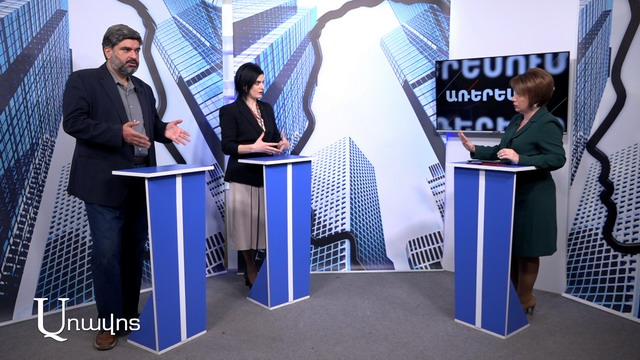Still, on July 8, 1992, the RA Supreme Council adopted a decision, the 2nd point of which specifies: “It is unacceptable for the Republic of Armenia to consider any international or domestic document by which the Republic of Nagorno Karabakh will be mentioned as a part of Azerbaijan.”
Are Nikol Pashinyan’s statements about recognizing the territorial integrity of Azerbaijan with borders of 86 thousand 600 square kilometers, including Artsakh, not contrary to this legislative requirement?
The guest of the “Areresum” (“Confrontation”) program, researcher of the Center for Civilization and Cultural Studies, Iranologist Anna Gevorgyan, stated that she is not a specialist in international law and does not know how illegal it is to make such a statement, referring to the decision of the SC. “Solving the issues by military means was also an illegal step taken by Azerbaijan, but we never saw certain legal consequences.” However, she also mentioned: “We often seem to put aside the defeat in the war and its consequences and want to have a retrospective of the situation that existed in the 90s.” There are other legal arguments: the RA Prime Minister does not have sole authority to recognize the territorial integrity of another country.
According to Clause 1 of Article 123 of the Constitution of the Republic of Armenia, “The President of the Republic of Armenia is the head of the state,” so he is the one who has the right to make such statements on behalf of the Republic of Armenia, relying on already signed and ratified international agreements. And until the Constitutional Court confirms the compliance of the international treaty with the Constitution of the Republic of Armenia and the National Assembly ratifies it, no official has the right to make such statements on behalf of the Republic of Armenia.
Read also
Is Pashinyan not calling into question the Declaration of Independence of Armenia and the Constitution of Armenia, in which our state’s commitment to Artsakh is clearly stated, with the statement regarding recognizing Azerbaijan’s territorial integrity, including Artsakh?
In response to the question about this, the other guest of the program, political scientist and former member of the National Assembly Mikayel Zolyan, clearly said: “There are objective realities, and the policy of any state is formed under the influence of these objective realities, not legal documents. We can accept a document that Western Armenia is also an integral part of Armenia, but the fact is that Western Armenia is not in the territory of Armenia today, and we have no chance to bring it back.”
Mikayel Zolyan also mentioned that the independence of Artsakh was not recognized under any leader of Armenia. “If you don’t recognize it, it means you recognize it as the territory of another state.”
Anna Gevorgyan countered: “Not recognizing its independence does not mean recognizing it as part of Azerbaijan. In any case, there was a negotiation process, and making such a unilateral decision meant leaving that negotiation process and having the same situation as in 2020.”
Mikayel Zolyan said: “This debate of ours about who surrenders or who does not surrender leads us to the wrong place. We should focus on how to make Armenians stay in Artsakh. The Prime Minister of Armenia can declare that we do not accept any status other than independence. Will it lead to Armenians staying in Artsakh? That’s the question.”
Anna Gevorgyan’s objection was explicit: “All those documents that assumed settlement and could be acceptable for Armenia and, unfortunately, were aborted, they assumed postponement of the status issue. And there was never a question about whether it means to recognize it as a part of Azerbaijan. In other words, it is a radical approach.”
However, she also agreed. “It is necessary to start from the current realities and understand how it is possible to have an effective mechanism in the current conditions so that Armenians can stay in Artsakh and have security.”
And to the question: how will they force or convince Azerbaijan not to violate the rights of the people of Artsakh if, at this very moment, Azerbaijan is violating and is not receiving any punishment, Mikayel Zolyan answered: “Unfortunately, there are no guarantees.”
The entire conversation is in the video.
Anna ISRAYELYAN


























































